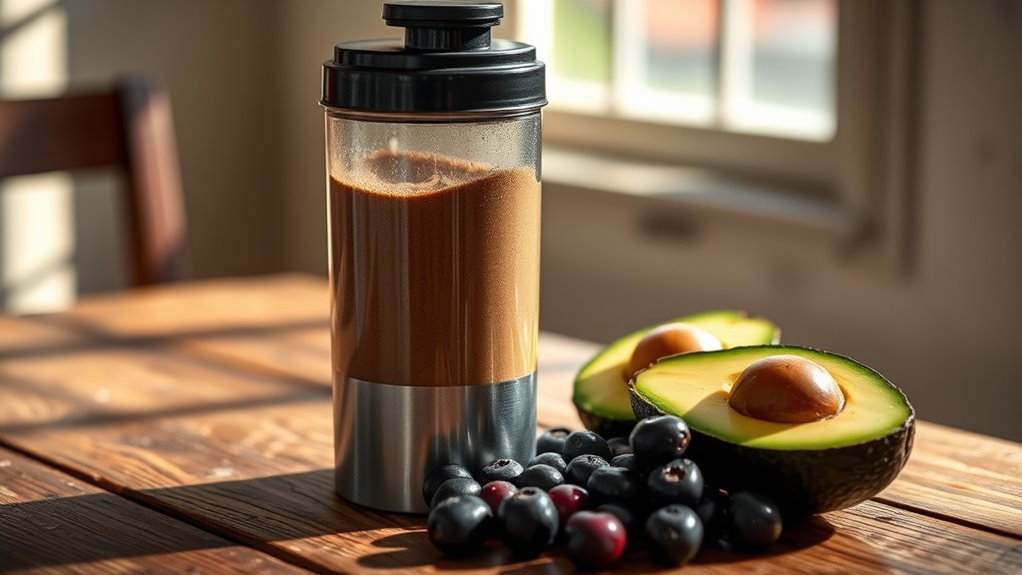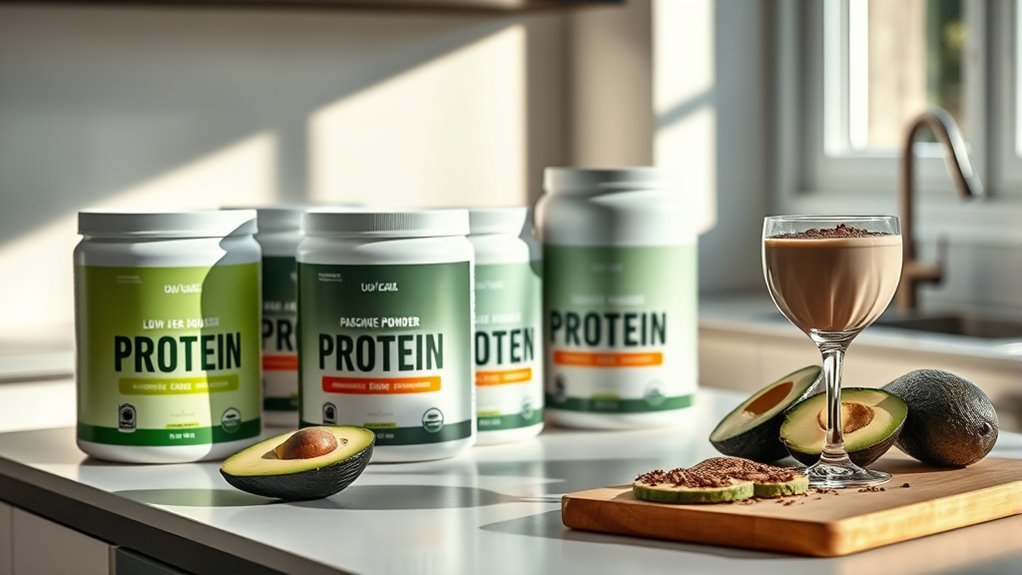Yes, you can have protein powder on a keto diet. Just make sure to choose low-carb options like whey isolate, collagen, or egg white protein to stay within your macronutrient goals. Protein is essential for muscle preservation and satiety while on keto. It’s important to check ingredient labels for hidden sugars and fillers. By doing so, you can enhance your diet without disrupting ketosis. If you want to learn more about best practices and options, continue exploring!
Understanding the Ketogenic Diet

When you plunge into the ketogenic diet, you’re not just cutting carbs; you’re fundamentally changing the way your body sources energy. The keto basics involve considerably reducing carbohydrate intake while increasing fats, pushing your body into a state of ketosis. Here, your body shifts from using glucose as its primary fuel to burning fat. However, diet misconceptions abound—many think keto is solely about meat and cheese. In reality, it’s crucial to include healthy fats like avocados and nuts, alongside non-starchy vegetables to guarantee balanced nutrition. Embracing this diet can lead to greater freedom in food choices, provided you stick to the principles of ketosis. Understanding these fundamentals helps you navigate towards a healthier lifestyle effectively.
The Role of Protein in a Keto Diet

As you adopt a ketogenic lifestyle, understanding the role of protein becomes essential for maintaining balance in your diet. Protein is vital for muscle preservation, especially when you’re in a caloric deficit. It helps repair tissues and supports overall health while keeping you feeling satiated.
Here’s a quick look at some popular protein sources:
| Protein Source | Protein Content (per 100g) | Ideal for Keto? |
|---|---|---|
| Chicken Breast | 31g | Yes |
| Eggs | 13g | Yes |
| Tofu | 8g | Yes |
Incorporating these protein sources can help you stay on track and maintain muscle mass while enjoying the freedom of a keto diet.
Types of Protein Powders Available

When choosing a protein powder on a keto diet, you’ve got several options to evaluate. Whey protein isolate is popular for its high protein content and quick absorption, while plant-based alternatives cater to those seeking non-dairy sources. Additionally, collagen protein offers unique benefits for skin and joint health, making it a versatile choice for your nutritional needs.
Whey Protein Isolate
Whey protein isolate stands out as a popular choice among those following a ketogenic diet, thanks to its high protein content and low carbohydrate levels. It’s derived from milk during the cheese-making process, making it a high-quality protein source. The whey benefits include rapid absorption, muscle recovery, and support for weight management.
Here’s a quick comparison of whey protein isolate:
| Aspect | Details |
|---|---|
| Protein Content | 90% or more |
| Carbs | 1-3 grams per serving |
| Fat | Minimal, often less than 1g |
Choosing whey sources that are high-quality and low in additives can enhance your keto journey. Enjoying this protein can keep you on track while supporting your nutritional goals.
Plant-Based Options
While whey protein isolate is a favored option for many on the ketogenic diet, plant-based protein powders also offer a variety of choices that can fit into your keto lifestyle. If you’re seeking vegan protein sources, consider options like pea protein, hemp protein, and brown rice protein. These plant-based proteins provide essential amino acids while being low in carbohydrates, making them suitable for your dietary needs. Pea protein, in particular, is known for its high digestibility and muscle-building potential. When selecting a vegan protein powder, always check for added sugars and fillers that could disrupt your keto goals. Embracing these plant-based proteins allows you to diversify your protein intake while remaining aligned with your keto principles.
Collagen Protein Benefits
Although many focus on traditional protein sources, collagen protein has gained popularity for its unique benefits that align well with the ketogenic diet. Collagen offers essential amino acids that support joint health, skin elasticity, and gut integrity—important factors for those on keto. You’ll find collagen sources in bone broth, fish, and bovine collagen powders, making it easy to incorporate into your diet. Research suggests that collagen benefits can enhance muscle recovery and support overall wellness, complementing your low-carb lifestyle. Plus, it’s low in carbs, which makes it a great fit for keto. So, if you’re looking to diversify your protein intake while reaping these advantages, consider adding collagen protein to your regimen.
Evaluating Protein Powder Ingredients
When choosing a protein powder on keto, it’s vital to understand the types available and how to analyze their ingredient labels. Different protein sources, like whey, casein, and plant-based options, can affect your macronutrient ratios. By carefully reviewing the ingredient list, you can guarantee that your choice aligns with your keto goals and dietary preferences.
Types of Protein Powders
As you navigate the world of protein powders on a keto diet, it’s essential to evaluate the ingredients carefully, since not all protein powders are created equal. You’ll find various types, like whey protein and casein protein, which offer high-quality amino acids and are low in carbs. Casein digests slowly, making it ideal for overnight muscle recovery. Alternatively, if you prefer plant-based options, vegan protein sources like pea or hemp can be suitable, but check for carb content, as some may have added sugars. Always prioritize clean ingredients without fillers or artificial sweeteners, ensuring your choice aligns with your keto goals. By understanding these options, you empower yourself to make better decisions fitting your lifestyle.
Ingredient Label Analysis
Many people underestimate the importance of analyzing ingredient labels when selecting a protein powder for a keto diet. You want to guarantee that the product aligns with your nutritional goals, so pay attention to ingredient sourcing. Look for powders that prioritize high-quality ingredients, avoiding fillers or sugars that can throw you out of ketosis. Nutritional transparency is essential; a clear label helps you understand what you’re consuming. Check for the protein content, carb count, and any artificial additives. Remember, not all protein powders are created equal, and even small differences can impact your keto journey. By being diligent about ingredient analysis, you can enjoy the benefits of protein powder while maintaining your commitment to a low-carb lifestyle.
Low-Carb Protein Powder Options
Choosing the right protein powder can be challenging on a keto diet, especially since many traditional options are high in carbohydrates. However, there are low-carb protein shakes that can fit seamlessly into your lifestyle. Look for keto-friendly brands that specifically market their products as low in carbs. Options like whey isolate, collagen protein, and egg white protein are excellent choices, providing the necessary protein without the excess carbs. Brands such as Perfect Keto and Quest offer delicious flavors that won’t disrupt your ketosis. Always check the ingredient label for hidden sugars or fillers. By selecting the right low-carb protein powder, you can enjoy your fitness goals while staying true to your keto lifestyle.
How to Calculate Protein Intake on Keto
Finding the right protein powder is just one aspect of maintaining a successful keto diet; understanding how to calculate your protein intake is equally important. To determine your ideal protein needs, aim for about 0.6 to 1.0 grams of protein per pound of lean body mass. Incorporate high-quality protein sources like chicken, fish, and eggs, alongside your powder. Don’t forget protein timing—distributing your intake throughout the day can enhance muscle retention and overall health. Monitor your macronutrient ratios to guarantee you stay within your carb limits while meeting your protein goals. Ultimately, a balanced approach will provide the freedom to enjoy your meals while supporting your ketogenic lifestyle and its benefits.
Best Practices for Using Protein Powder on Keto
When using protein powder on a keto diet, it’s essential to select low-carb options to align with your macronutrient goals. You’ll also want to keep an eye on your overall protein intake, as excessive protein can interfere with ketosis. Additionally, considering the timing of your protein consumption and incorporating it into meal prep can enhance your diet’s effectiveness.
Choose Low-Carb Options
To maintain ketosis while incorporating protein powder into your diet, it’s crucial to select low-carb options that align with your nutritional goals. Choosing the right protein sources not only supports your muscle health but also keeps your carb intake in check. Here are some tips to help you:
- Look for protein powders with minimal carbs and sugars.
- Explore low-carb recipes that incorporate protein powder seamlessly.
- Opt for whey or plant-based proteins that are low in carbs.
- Check labels for hidden sugars and fillers.
Monitor Protein Intake
How can you effectively monitor your protein intake while on a keto diet? Start by understanding your individual protein needs, which can vary based on activity levels and goals. Aim for a protein balance that complements your low-carb regimen, typically around 20-25% of your total daily calories. Utilize intake tracking apps or food diaries to log your meals and supplements, ensuring you stay within your desired protein range. Remember, protein powders can be a convenient way to boost your intake, but they shouldn’t replace whole foods. Keep an eye on the total macros, including fats and carbs, to maintain ketosis. By tracking your intake meticulously, you’ll have the freedom to enjoy your diet while achieving your health goals.
Timing and Meal Prep
While planning your meals on a keto diet, incorporating protein powder at the right times can enhance your nutritional strategy. Effective meal timing and smart prep strategies can make all the difference. Here are some best practices to take into account:
- Post-workout fuel: Use protein powder to replenish energy and support muscle recovery.
- Meal replacement: Blend it into smoothies when you’re short on time but need nourishment.
- Snack on-the-go: Mix protein powder with nut butter for a quick, satisfying snack.
- Support your macros: Guarantee protein intake aligns with your keto goals for peak results.
Potential Pitfalls of Protein Powder Consumption
Although protein powders can be a convenient source of nutrition on a keto diet, they come with potential pitfalls that you should be aware of. You might encounter digestion issues, especially if the protein quality isn’t satisfactory. Relying too much on protein powders for meal replacement can lead to an imbalance in nutrients. Additionally, flavor additives can sneak in unwanted carbs, affecting your ketosis. Consider the satiety effects; protein powder may not keep you full as long as whole foods. Finally, evaluate cost considerations, as high-quality powders can be pricey. By understanding these factors, you can better align protein powder use with your personal goals.
| Potential Pitfalls | Considerations |
|---|---|
| Protein Quality | Opt for high-quality sources |
| Digestion Issues | Monitor your body’s response |
| Meal Replacement | Don’t rely solely on powders |
| Flavor Additives | Check for hidden carbs |
| Cost Considerations | Balance quality and budget |
Real-Life Success Stories on Keto and Protein Powder
When you look at the success stories of individuals on the keto diet, many highlight the role of protein powder as a key component in their journey. These personal experiences often reveal how protein powder helped them stay on track, providing needed nutrients while keeping carbs low. Here are some common themes from success testimonials:
- Increased energy levels for workouts
- Satisfying hunger between meals
- Simplified meal prep and planning
- Enhanced muscle recovery after exercise
Incorporating protein powder into their regimen allowed many to maintain flexibility and freedom in their diet. By focusing on quality ingredients, they found a sustainable way to reach their health goals while enjoying the benefits of a keto lifestyle.
Alternatives to Protein Powder for Keto Dieters
If you’re looking for alternatives to protein powder on a keto diet, you’re in luck—there are plenty of options that can help you meet your protein needs without the added carbs. Whole foods like eggs, chicken, and fatty fish are excellent sources of protein and offer high nutrient density, making them great meal replacements. Greek yogurt is another option; it’s low in carbs and rich in protein. Nuts and seeds can also contribute to your protein intake while providing healthy fats. If you prefer convenience, consider making smoothies with nut butter and leafy greens for a nutrient-packed drink. These alternatives not only keep you on track with your keto goals but also enhance your overall dietary variety.
Frequently Asked Questions
Can Protein Powder Kick Me Out of Ketosis?
Protein powder can potentially kick you out of ketosis if it contains high levels of carbohydrates. It’s vital to choose low-carb protein sources that align with your keto goals. Monitoring your total daily carb intake is essential to maintain ketosis effects. If you’re mindful of the protein powder’s carb content, it can fit into your diet without disrupting your progress. Always prioritize quality sources to support your overall health while enjoying freedom in your meals.
How Much Protein Powder Can I Consume Daily on Keto?
You can typically consume around 20-30 grams of protein powder daily on keto, depending on your overall protein intake. It’s crucial to reflect on your daily limits to stay within your macro goals. Aim for a total protein intake of about 15-25% of your daily calories. Remember, individual needs vary, so listen to your body and adjust accordingly. Balance is key, and protein powder can be a convenient way to meet your needs.
Are Plant-Based Protein Powders Suitable for Keto?
Yes, plant-based protein powders can be suitable for keto, with many containing low carbs. Curiously, studies show that around 60% of people on keto find it challenging to meet their protein needs. If you choose a plant protein, look for options like pea or hemp that have keto compatibility. Just be mindful of the carb content, as some blends might include added sugars. Always check labels to verify they align with your keto goals!
Can I Use Protein Powder in Keto-Friendly Recipes?
Yes, you can definitely use protein powder in keto-friendly recipes! It’s a great way to boost your protein intake without adding too many carbs. You can incorporate protein powder into keto-friendly smoothies for a nutritious breakfast or snack. Additionally, it works well in protein powder baking, allowing you to create delicious treats while sticking to your keto goals. Just be sure to choose low-carb options to keep everything in line with your diet.
Should I Avoid Flavored Protein Powders on Keto?
You don’t have to avoid flavored protein powders on keto, but choose wisely! Some flavoring types contain added sugars or carbs that can kick you out of ketosis. Look for options sweetened with keto-friendly sweeteners like stevia or erythritol. They’ll keep your protein shakes tasty without sabotaging your goals. Just remember, moderation is key, and always check labels to verify you’re staying within your carb limits. Enjoy your shakes, guilt-free!
Frequently Asked Questions
1. Can you have protein powder on a keto diet?
Yes, you can have protein powder on a keto diet. However, it’s important to choose low-carb protein powders to align with the macronutrient goals of the ketogenic diet. Whey protein isolate, collagen peptides, and plant-based protein powders like pea protein can be good options. Always check the nutrition label for carbohydrate content to ensure it fits within your daily carb limit.
2. What types of protein powders are best for keto?
The best types of protein powders for a keto diet are those that are low in carbohydrates and sugar. Whey protein isolate is a popular choice as it typically contains less than 1 gram of carbs per serving. Other options include casein protein and egg white protein. Plant-based protein powders like hemp or pea protein can also be suitable, but it’s essential to check their carb content.
3. How much protein powder can I consume on keto?
The amount of protein powder you can consume on a keto diet varies depending on your individual goals, daily protein needs, and overall macronutrient breakdown. Generally, it’s recommended to consume moderate protein, about 20-25% of your total caloric intake, while keeping carbohydrates low. A common guideline is to aim for around 0.6 to 1.0 grams of protein per pound of lean body mass. Always consult with a healthcare provider or nutritionist for personalized recommendations.
4. Can protein powder kick me out of ketosis?
Consuming protein powder in moderation is unlikely to kick you out of ketosis, especially if you select a low-carb option. However, excessive protein intake can potentially increase gluconeogenesis, where the body converts protein into glucose, which may affect ketosis. It’s crucial to balance your protein intake with your overall carbohydrate and fat consumption to maintain ketosis.
5. Are there any side effects of using protein powder on keto?
While protein powder can be a convenient addition to a keto diet, some individuals may experience side effects such as digestive discomfort or bloating, especially with whey protein or certain plant-based proteins. Additionally, consuming too much protein may lead to unwanted weight gain if it results in excess calorie intake. It’s essential to listen to your body and adjust your protein powder consumption accordingly. If you have any concerns, consult a healthcare professional.
References
- https://www.healthline.com/nutrition/protein-powder-keto
- https://www.medicalnewstoday.com/articles/why-is-protein-important-on-keto
- https://www.dietdoctor.com/low-carb/protein
- https://www.ncbi.nlm.nih.gov/pmc/articles/PMC6363435/
- https://www.ncbi.nlm.nih.gov/pmc/articles/PMC5967950/
- https://www.wellnessmama.com/nutrition/keto-diet-guide/
- https://www.cdc.gov/healthyweight/healthy_eating/protein.html


